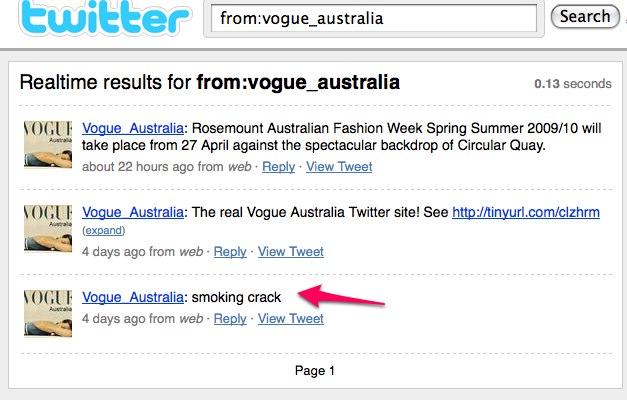It’s inspired by this photo I found on Tumblr this weekend.
Celebrities are used to living under the harsh glare of constant scrutiny, where even their rubbish bins are combed for the ultimate levels of personal information. But public living is starting to overflow into ordinary lives – mainly when a lot of people subscribe to a Twitter feed or Facebook status updates. Many people who don’t get Twitter, don’t understand the attraction of watching the micro patterns of a huge range of semi-strangers lives unfold in front of your eyes. Facebook is about subscribing to the lives of poeople you know. Twitter is about subscribing to the lives of people you don’t know. What constitutes oversharing on the public channel of Twitter?
This is an issue which is only going to get more intense as more and more people jump on Twitter and start talking about their workplaces, or better making witty and sarcastic comments at the said workplace’s expense. Leslie Nassar a.k.a. The Fake Stephen Conroy was “let go” from his employer Telstra when his real identity was revealed. A Telstra employee could not be seen to be sardonically depicting the Minister responsible for trying to impose an internet filter that Telstra supported and no-one wanted. Leslie is going to be talking about his experiences as the Fake Stephen Conroy in the Social Media Club Sydney’s first event on 27th April Authenticity and Transparency in Social Media.
A lot of the general issues arise around whether you want to be held accountable for what you say because of the archiving quality of the internet. If you say something nasty in a verbal conversation its easy to deny it or have it forgotten. There is an aspect of having to silo different parts of your life off depending on how publicly you want to live. There’s also an aspect of creating an alternate persona (by impersonating a celebrity, brand or magazine you naturally attract a lot of attention and people following. Long term, you will have to sustain the following through decent content, at least on a superficial level you may be able to attract on fake name alone) It’s also really hard when random people start taking pot shots at you on a public channel like Twitter and you are trying to hold it together and not engage in a public mud slinging.
Australia has a tiny population compared to Europe or the US and as a consequence our digital industry is a petri dish. It’s hard to forget that everyone working within it is practically known to everyone else. The ramifications can be quite dramatic if you manage to damage your reputation through carelessness, saying the wrong thing on a public channel and all of a sudden its brand x down the gurgler.
@RubyRose1 (an Australian MTV presenter) wanted to run away from Twitter based on a Daily Telegraph story about a conversation with Jess from the Veronicas. She could have DM’d Jess and not become tabloid fodder. She’s done the sensible thing now and locked her updates instead.
I am proud to out myself as an E! Channel E! News watcher. In the last 2 weeks or so there is at least one daily report of which celebrity is tweeting what to the masses. So a lot of angst of private being the new public relates to the equation:
- how famous/reputable you are
- relative to how private you want to keep your life
- relative to your awareness of who your talking to
- and what you are saying
- how public the channel is
I personally silo off different “roles” to different social networks. I like leaving Facebook for people I know personally and limit profile to work colleagues. Professional, career building stuff stays in LinkedIn. Twitter is a mixed bag of everything and is the closest to the real me. I have become a lot more conscious of Twitter’s public channel aspects lately but rather than deleting tweets, I’ll take the conversation to DM if I want to keep it private. I stand by everything I write online, ironically, I am far more straight up in person, in terms of expressing my personal opinions. Working in advertising, you never know who your next client is going to be – bummer if there’s an online rant that you can’t take back. So my non-celebrity life is nicely segmented into private vs public on 3 social networks, with some filtering.
Here is an example of blundering around in public from people who should know better:

This week, Vogue Australia took to Twitter as @Vogue_Australia and made a crass public first tweet once they engaged the lawyers to harrass the fan who had taken @VogueAustralia. (They did delete said crack smoking tweet, but you have to love Twitter search caching)
Has anyone else been caught in the crossfire of taking their previously private life into the new public sphere? Please share your story.
2 Comments
Just a head's up: @Vogue_Australia isn't Vogue Australia's.
Whether @Vogue_Australia is real or not – its now more about the fact that it's been reported as real, and if it isn't then more fool the editors who are dragging their feet not getting on Twitter. The one that is the “fan” account is the one I follow @VogueAustrala and they alerted me to the hoohah over the account. Have a read of @VogueAustralia public updates its a great account of what happened.